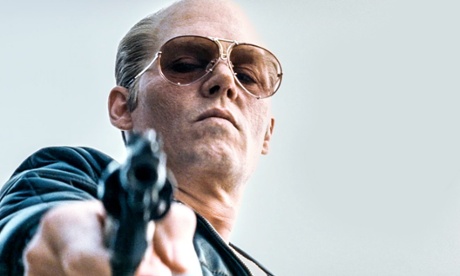
Scott Cooper’s Black Mass is a big, brash, horribly watchable gangster picture taken from an extraordinary true story and conceived on familiar generic lines. Johnny Depp’s south Boston wiseguy James “Whitey” Bulger, with his shaven bald head and weird blue eyes is a fully accredited sociopath with a groany deep voice like Ray Liotta in GoodFellas. He even has a “Funny, how?” moment like Joe Pesci from the same film: kidding around and persuading his corrupt FBI associate over dinner into divulging the secret family recipe for his steak dish – then turning very nasty about how easily his dining companion can be induced to spill the beans, and then uproariously pretending to have been kidding once everyone around the table has turned white with shock.
But Cooper and his screenwriters Mark Mallouk and Jez Butterworth have something substantial to add to the genre: making the point that gangsters do not arise from nowhere like comic-strip supervillains. They are the symptoms of political corruption, parasites created by agencies of the state, and by weak, credulous law enforcement officials who are content to sub-contract policing to the bad guys.
The film is based on one of the ripest true stories of political chicanery, stranger than fiction and something to be savoured by anyone who remembers the moment in the Godfather when the Don himself fantasises about the idea of “Senator Corleone”. In the 1970s and 80s, Whitey Bulger (played by Depp) was a violent and malevolent ex-con in south Boston whose brother really was the Massachusetts State Senator Billy Bulger, played with a cat-that-got-the-cream smirk by Benedict Cumberbatch. The Bulger boys grew up on the same tough streets as John Connolly, played by Joel Edgerton, an FBI man with a big idea. Connolly will use his contacts in the Irish-American “Southie” community, and Bulger in particular, to get the big prize: nailing the Italian Cosa Nostra in the north of the city.
Connolly and Whitey share a sentimental sense of Irish neighbourhood loyalty and tribal paranoia, keen to stick it to the hated “eye-talians” and also the Waspy non-Irish of Cambridge and the “Brits” in the “Six Counties” — meaning Northern Ireland. One of Whitey’s most prized pet projects is shipping arms to the provisional IRA.
In return for virtual immunity from prosecution, Whitey Bulger will give Connolly valuable “intel” on the Italians in the north. His gangster kingdom is simply down to this – and not to any supposed Napoleonic charisma. But is that all that’s happening? With a sinking feeling of dismay, the FBI chief, played by Kevin Bacon, senses that the information gleaned from Whitey is in fact not especially valuable, and that he may simply have been played by his loquacious and confident subordinate, Connolly, who in turn simply has an enduring beta-male need to suck up to Whitey Bulger, the guy who ruled the schoolyard when they were both little kids.
Johnny Depp and Joel Edgerton both give richly absorbing performances of preening macho self-regard and self-delusion. Depp’s Whitey is a kingpin criminal who makes a very big deal of his loathing of rats and informants – but he is the biggest informant-rat of all. Edgerton’s Connolly is a lawman who hates drug-dealers, but he has enriched himself and advanced his career by promoting a gangster, notorious for introducing 12-year-olds in Boston to drugs.
Mallouk and Butterworth’s script introduces some satisfyingly nasty twinges and shocks. The one moment in Whitey’s life which should make us almost sympathetic is when his son becomes gravely ill after contracting a fever and being put on life support; his tormented wife Lindsey (a brief role for Dakota Johnson) says she is ready to “pull the plug”. In a later scene, Kevin Bacon uses precisely this phrase, threatening to end his support for Connolly’s costly “informant” plan for Bulger. The echo flavours the scene with a cynical nausea, and the agony of Bulger’s dying son returns when Whitey insists on confronting Connolly’s wife Marianne (Julianne Nicholson) who has been pretending to be ill so as not to socialise with him. With a sinister pretend concern, Whitey leaves the dinner table and intrudes into her bedroom, feeling her glands and tenderly asking her to look after herself: his menace is horribly unsubtle, but the clear memory of his late son makes this a more complicated and macabre moment.
Black Mass is a title which might lead you to expect a great importance for the Catholic church which is, after all, so important in the neighbourhood – local kids became priests as well as cops and robbers. In fact, the church isn’t too relevant. This is a secular, pessimistic tale about how gangsters are nurtured like microbes in a petri dish by corruption; it is acted and directed with tremendous confidence and verve.
- This article was amended on 4 September to correct the second mention of the names of the scriptwriters.







